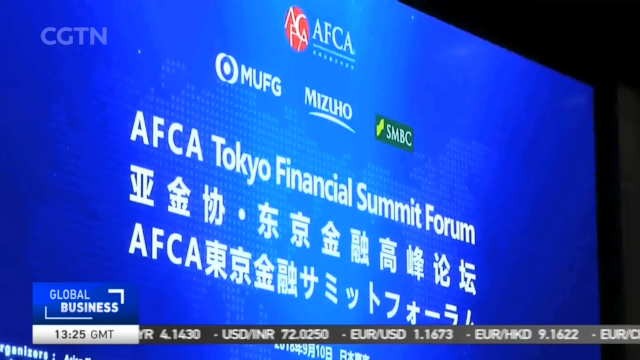
21:54, 13-Sep-2018
Asian Financial Cooperation Summit: Making financial services more accessible to public
Updated
21:21, 16-Sep-2018
02:43

The Asian Financial Cooperation Association held its second annual financial summit in Tokyo this year. A major theme at the gathering, financial innovation. Mayu Yoshida reports.
In the land of humanoid robots and high-tech gadgets, fintech is the next frontier. That was the theme of this year's Asian Financial Cooperation Association summit in Tokyo. The forum serves as an information-sharing platform to make financial services more accessible to the public through technologies like mobile banking and cryptocurrencies.
YASUHIKO USHIKUBO, GM MIZUHO BANK "We created a joint venture with Softbank to boost investment in young fintech entrepreneurs including students. However, our top priority is to spur a cashless economy. Unlike China, Japan is still dependent on cash."
MAYU YOSHIDA TOKYO "Participants from global financial institutions talked about a variety of topics from unmanned bank branches, mobile payments and of course blockchain, but all in all, it was all about how financial innovation can help drive regional growth."
TIAN GUOLI, CHAIRMAN CHINA CONSTRUCTION BANK "As two great economies, it's very important to boost financial cooperation between China and Japan. With increasing regional growth, guarding against risks, especially anti-money laundering, controls cooperation and both countries will obtain positive results."
Even big Japanese banks, notorious for their stodgy culture, are diving into fintech partly because of growing competition with startups. Shinichi Takatori left his job at a top bank to start his own business that offers a pre-paid digital wallet app. Within three years, his staff numbers grew five-fold and he secured deals with his former bank and other global credit companies.
SHINICHI TAKATORI FOUNDER CEO OF KYASH "Financial industries has been always protected by regulations, and it's a little bit segregated industry. But a lot of people, I mean a lot of companies, are able to come into this market which brought much more fair and healthy competitive environments as an industry."
The number of startups in Japan like Takatori's are likely to increase with new rules governing the industry. The government is looking to double the amount of cashless settlements to 40% of all transactions. Major banks are pushing projects to develop platforms using everything from QR codes to digital currencies. And officials are easing regulations to catch up with more advanced cashless countries like China.

SITEMAP
Copyright © 2018 CGTN. Beijing ICP prepared NO.16065310-3
Copyright © 2018 CGTN. Beijing ICP prepared NO.16065310-3